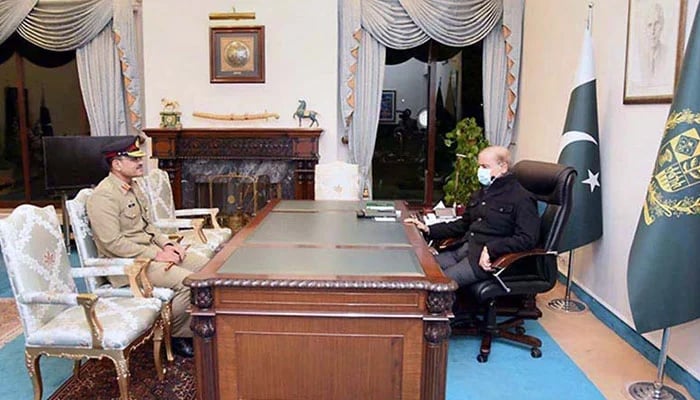Unleashing powerhouse to attract investments
PM Shehbaz Sharif forms apex committee including COAS, in bold move aimed at invigorating Pakistan’s economic landscape
June 22, 2023

In a bold move aimed at invigorating Pakistan’s economic landscape, Prime Minister Shehbaz Sharif has announced the establishment of the Special Investment Facilitation Council (SIFC).
Notably, the Chief of the Army Staff (COAS) will be extended a special invitation to join this apex committee, adding a significant military dimension to the council’s operations.
By integrating the expertise and resources of both civilian and military leadership, the SIFC aims to consolidate its status as a formidable force in attracting investments.
SIFC is designed to leverage the collective strengths and expertise of both the civil and military sectors in Pakistan. By presenting a united front to potential investors, SIFC strives to instill confidence and showcase a shared commitment to sustainable economic growth.
This collaborative approach aims to attract investments and promote the long-term development of the country, ensuring a prosperous future for Pakistan.
This visionary initiative aims to attract substantial investments from the Gulf Cooperation Council (GCC) countries, specifically targeting key sectors such as defence production, agriculture, minerals, IT, and energy.
With this move, the prime minister has demonstrated his commitment to spearheading a comprehensive economic revival plan for the nation.
The formation of the SIFC marks a pivotal moment in Pakistan’s economic landscape.
By strategically engaging with the GCC countries, which boast robust economies and abundant investment potential, Pakistan stands to benefit from their financial resources and valuable market connections.
The council’s primary objective is to facilitate a seamless investment process, fostering an environment that encourages both local and foreign investors to capitalise on the vast potential of the designated sectors.
The SIFC’s focus on defense, agriculture, minerals, IT, and energy reflects a meticulous approach towards sectors that possess substantial growth prospects and the potential to uplift Pakistan’s economic trajectory.
The defence sector, for instance, offers opportunities for collaboration in advanced weaponry, joint ventures, and defence-related technology transfers. In the agricultural sphere, investments can contribute to modernising farming techniques, enhancing productivity, and tapping into the country’s agrarian potential.
Similarly, the mining and minerals industry presents avenues for extraction, processing, and value addition to unlock the hidden treasures beneath Pakistan’s soil.
The IT sector, with its immense potential for innovation and digital transformation, can become a driving force behind job creation, export growth, and technological advancements.
Furthermore, investments in the energy sector will not only address Pakistan’s energy needs but also pave the way for sustainable development by exploring renewable energy sources, such as solar and wind power.
While the establishment of the SIFC is undoubtedly a groundbreaking endeavor, its success in transforming Pakistan’s economic direction hinges on at least three crucial factors: implementing robust regulatory frameworks, ensuring transparency, and streamlining bureaucratic processes. These three will be vital to attract and retain investors.
Additionally, fostering a business-friendly environment through tax incentives, legal protections and infrastructure development will further incentivise investment inflows.
Singapore created the Singapore Economic Development Board (EDB) and successfully attracted foreign investment. India has the National Investment Promotion and Facilitation Agency. China has the Council for the Promotion of International Trade (CCPIT). South Korea has the Korea Trade-Investment Promotion Agency (KOTRA). And Australia has the Australian Trade and Investment Commission. Now Pakistan has SIFC.
The success of this initiative hinges on three key factors: effective implementation, a supportive business environment, and ongoing efforts to enhance human capital. Historically, policy continuity has been our Achilles’ heel.
It will be crucial to establish effective communication and collaboration between civil and military leadership for the SIFC to thrive. By employing the right strategies and demonstrating unwavering commitment, the SIFC holds the potential to reshape Pakistan’s economic landscape and guide the nation towards a prosperous future.
Disclaimer: The viewpoints expressed in this piece are the writer's own and don't necessarily reflect Geo.tv's editorial policy.
Originally published in The News











